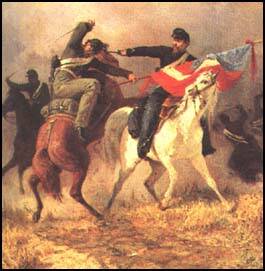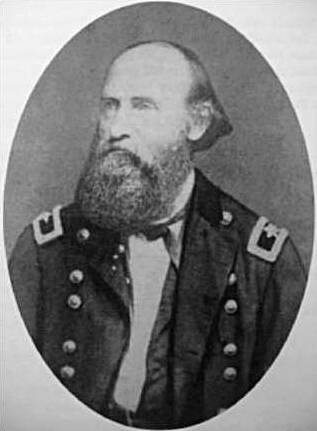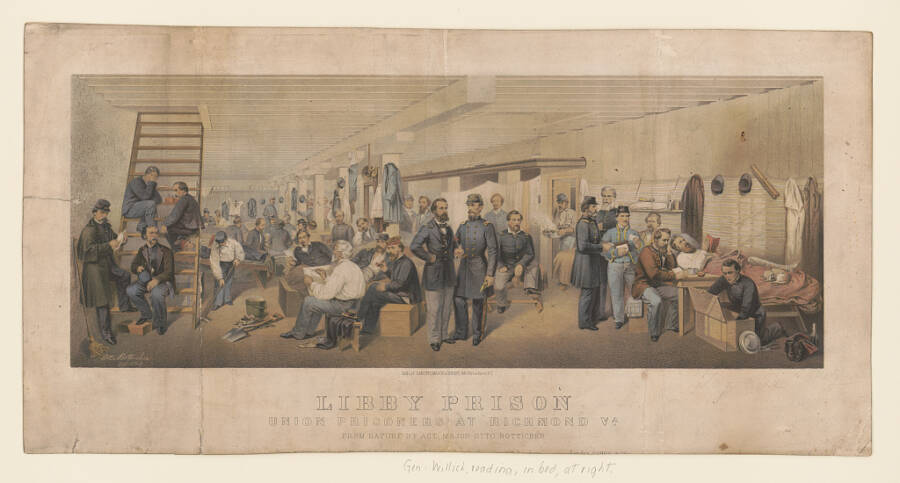From renouncing his Prussian nobility to challenging Karl Marx to a duel to fighting wars on multiple continents, August Willich's life story is truly one of a kind.
How does a child born into German nobility become a rebel, a communist, a proponent of democracy, a philosopher, and a war hero in the American Civil War? It seems far-fetched, but it actually happened to August Willich, who made his home in Cincinnati, Ohio.
Tumultuous twists defined Willich’s life as he journeyed throughout Europe and the United States. He would fight in Prussia, flee to England, win a duel in Belgium, start from scratch in America, and eventually fight and lead valiantly on the side of the Union.
From his shunned nobility to his ardent passion for communism to his unique leadership, August Willich was a one-of-a-kind figure in the history of the United States.
August Willich, From Noble To Revolutionary
He was born Johann August Ernst von Willich in 1810 in Braunsberg, East Prussia (now in Poland), to a noble Prussian family. His father was a captain in the hussars, a light cavalry unit that fought in the Napoleonic Wars. His father died when August was 3, leaving him to be raised by Friedrich Schleiermacher, a theologian, philosopher, and distant relative. Willich was rumored to be the illegitimate son of the Kaiser.
Young Willich was known to brag about it, though it can’t be proven. Schleiermacher ensured that young August was well educated, then sent him off to Berlin and Potsdam for military school. He served 19 years in the Prussian army and reached the rank of captain.

Wikimedia Commons“Willich im Kampf” (Willich in Battle).
But his interest in philosophy and republican leanings led to his military resignation in 1847. His fiery letter to the king of Prussia announcing his resignation was not accepted and even led to his court martial and trial. He was acquitted and allowed to resign.
That same year, he discarded his noble title and shortened his name to August Willich. He then became a prominent commander in the German Revolutions of 1848 and 1849. During the uprising, Willich fought two battles that ended badly, and he fled to Switzerland, eventually making his way to England.
In England, he was introduced to Karl Marx by his former aide-de-camp, Friedrich Engels, who later co-authored The Communist Manifesto.
But he eventually found Marx too conservative, as he wanted democratic communism, even challenging Marx to a duel. The duel never happened, but Marxist Konrad Schramm later challenged Willich.
With duels illegal in the United Kingdom, they relocated to Belgium for the contest. Willich’s bullet grazed Schramm’s head but didn’t kill him. Schramm died eight years later of tuberculosis.
Escape To America And Civil War Service
Spurned by his newfound community, August Willich came to the United States in 1853. Like many new American immigrants, he was penniless, so he worked as a carpenter in the Brooklyn Navy Yard and as a mathematician in the U.S. Coastal Survey.
In 1858, he moved to Cincinnati to become the editor of a German-language newspaper. The newspaper was a pro-labor publication. Willich became known as an “Ohio Hegelian,” part of a group of German Ohioans who followed philosopher Georg Wilhelm Friedrich Hegel.
When the Civil War began, Willich, like many German Americans, volunteered for the Union Army. Many of them had fled Germany after the failed revolution because they were liberal-minded, and as such, most abhorred the idea of slavery.

Wikimedia CommonsAugust Willich during the American Civil War.
“I fought for liberty in the old country,” August Willich said in 1863, according to the Warfare History Network. “I fight for liberty in this country.”
He helped recruit Germans to the 9th Ohio Infantry, known as Die Neuner (The Nines), because of its almost all-German members. Willich was made first lieutenant and was sent to Virginia, where he saw action at the Battle of Rich Mountain. He then resigned his position to join the 32nd Indiana Regiment, another mostly German unit, and was made a colonel.
Willich’s troops fought at Shiloh, Tennessee, where he made a unique move to rally his troops on the second day of battle. His soldiers were unsteady and struggling under fire. With his back to the enemy, Willich stood before his forces and drilled his soldiers in the manual of arms.
He told the band to play “La Marseillais,” the anthem for Europe’s republican movement. When the 32nd regained its stability, it launched a bayonet attack.
General Lew Wallace, who witnessed the act, called it the “most audacious thing that came under my observation during the war. The effect was magical.” After the battle, Willich was made commander of the Horn Brigade.
Later, at the Battle of Stones River, August Willich was captured after his horse was shot out from under him and was taken to Libby Prison in Richmond, Virginia. Willich spent his four months of captivity developing a new rapid-fire attack system. When an exchange freed him, he quickly began implementing his work in the field.
Later that year, he returned to the army and served with distinction in the Tullahoma Campaign, with one Confederate soldier remarking of Willich’s new firing technique, “Lord Almighty, who can stand against that?”
He led a division in the Battle of Chickamauga, saw action in the Chattanooga Campaign, and joined William Tecumseh Sherman in the Atlanta Campaign.
He was wounded in Resaca, Georgia, and his brigade was sent back to Indianapolis. He was then put in charge of Cincinnati, where he served in administrative positions, as well as Covington and Newport, Kentucky.

Otto Boetticher/Library of CongressUnion prisoners at the Libby Prison in Richmond, Virginia.
His Life After The Civil War
After the war, August Willich worked in government service, including as the auditor of Hamilton County, Ohio.
But in 1870, he moved back to his homeland, offering his services to the Prussian army during the Franco-Prussian War, but he was turned down. He stayed in Germany long enough to get a degree in philosophy from the University of Berlin at age 60. Though he never saw the end of the German monarchy, he did live long enough to see Germany united as one country.
He moved back to Ohio and died in 1878 in St. Marys, Ohio, where he is buried. He was known by his troops as “Papa Willich” because of the kindness he displayed toward his soldiers.
“A soldier in every phrase of the term, able and skillful, on many a bloody field he demonstrated his ability and courage,” Brig. Gen. Richard W. Johnson had written of August Willich in January 1866. “[He] is a theoretical and practical soldier. He has made the science of war his study and there are few men his equal in military matters. He is thoroughly conversant with the military and political campaigns of Europe. He looks well to the interests of his men.”
After reading about the remarkable life of August Willich, check out Mathew Brady photographs that captured the American Civil War. Or, read about the staggering death total of the war, America’s bloodiest conflict.





